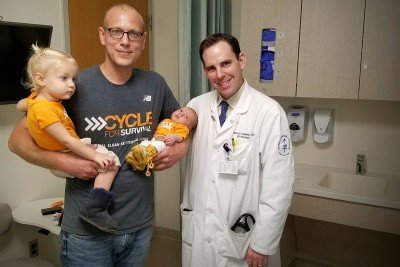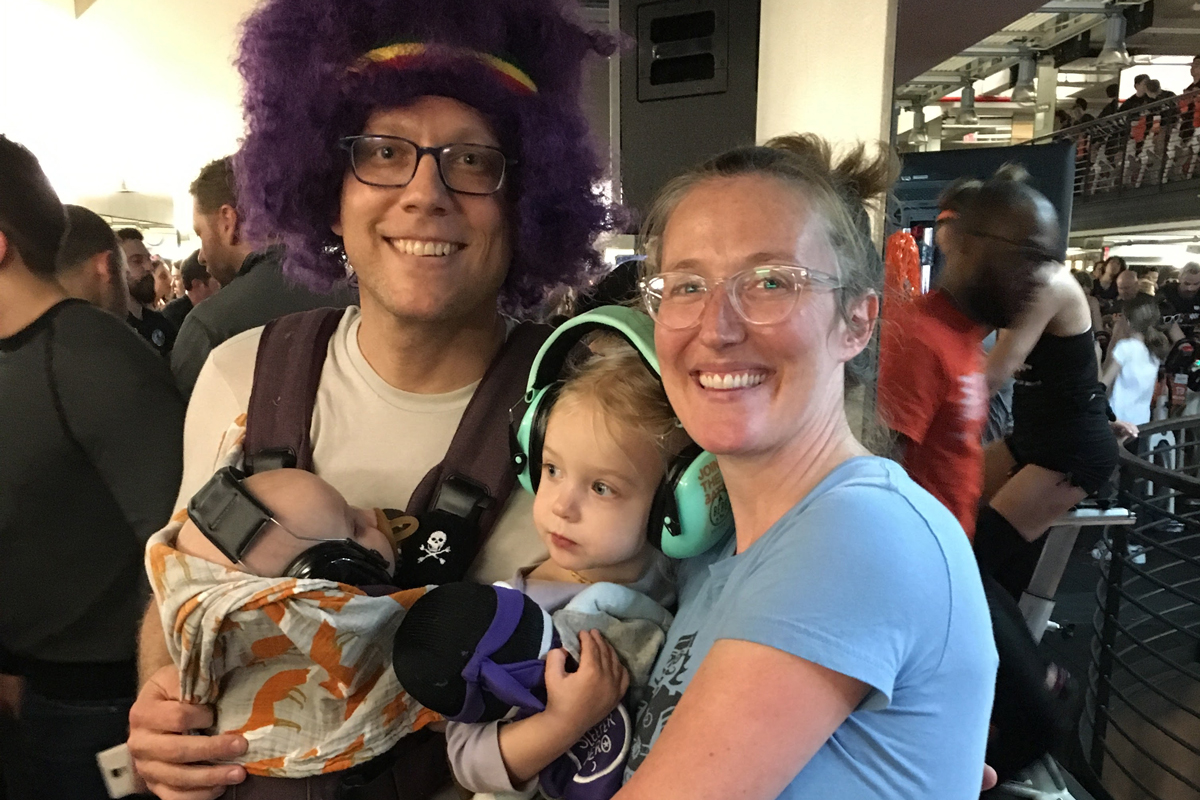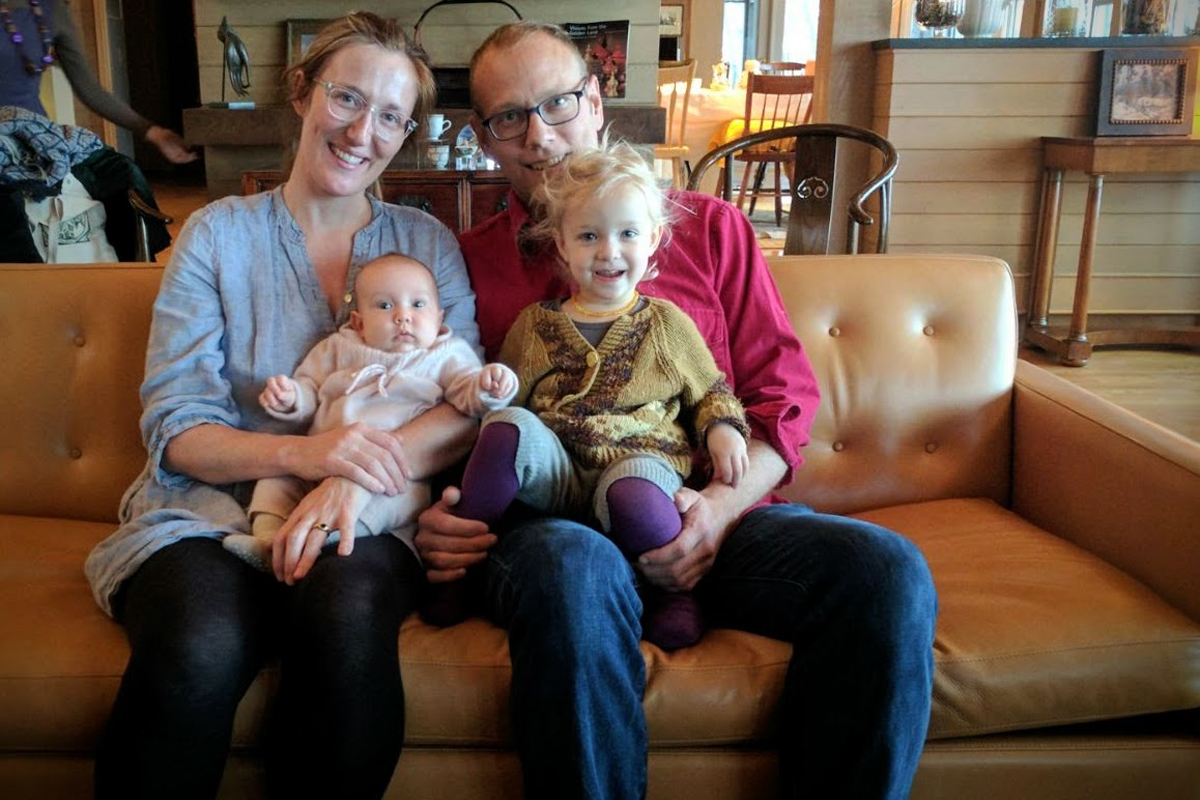Jay's Story
Jay’s life totally changed when he was diagnosed with an advanced form of testicular cancer. Despite multiple rounds of chemotherapy, surgeries, and complications, he remained upbeat and channeled his experience into helping others.

Unlike many men with testicular cancer, Jay Erickson never found a lump in his testicle. But in 2013, he experienced back pain that wouldn’t relent, despite multiple trips to a local clinic. He also had felt a lump in his abdomen, which gave him pause. When the pain got to be overwhelming, Jay, then 38, insisted on an ultrasound.
“That was a very early lesson in being your own advocate,” recalls the entrepreneur from Pawling, New York. “Because then it was off to the races.”
The ultrasound revealed a softball-size tumor in Jay’s abdomen. A CT scan detected an additional tumor next to his heart and many other tumors in his lungs. At first, doctors thought Jay had an advanced type of sarcoma. However, after a harrowing 48 hours waiting for test results, he learned that he actually had testicular cancer.
Jay and his wife, Katie Rose, researched their options for care. They chose Memorial Sloan Kettering because of its expertise in the disease, Jay says.
“Testicular cancer is so rare, so it’s really important to be at a place with a high volume of patients,” he says. “If you do the same thing all the time, you’re just better at it compared with other hospitals, and that’s important when it comes to outcomes.”
A Plan Comes Together
At MSK, Jay learned his cancer was a stage III germ cell tumor, specifically choriocarcinoma — the same form of cancer that cyclist Lance Armstrong had, which is typically seen in pregnant women. It was a very serious condition: One indication was the incredibly high amount of human chorionic gonadotropin (HCG) circulating in his body, a hormone that women make during pregnancy. In men without cancer, the level should be two or less. Lance Armstrong’s was approximately 120,000. Jay’s was 230,000.
Darren Feldman, a testicular cancer expert at MSK’s Sidney Kimmel Center for Prostate and Urologic Cancers, recommended that Jay undergo an intensive regimen of chemotherapy followed by surgery. The odds of cure were 50-50. But Dr. Feldman also offered Jay a unique option: a clinical trial comparing a new form of chemotherapy to the standard.
“Most people hope they’ll be assigned to receive the new regimen because we’re hoping it’s better, but if they’re not, they get the treatment they would have received anyway,” Dr. Feldman says.
Jay decided to enter the trial and was assigned the standard chemotherapy regimen. Even though he was still receiving the standard of care, he was still helping his medical team learn more about treatments of the future.
Thinking Ahead
Understandably, Jay had spent a lot of time concerned about his health, so when a fertility nurse approached him at an early appointment, he didn’t really have babies on the brain. But Dr. Feldman’s team presented Jay with the option to collect and store semen before he started treatment in case chemotherapy affected his sperm. Jay was a little surprised at first but then deeply grateful.
“That spoke volumes about MSK seeing the whole situation and the whole patient,” he says.
While he was undergoing chemotherapy at Memorial Hospital, Jay and his wife decided to try in vitro fertilization. The chances of the procedure working were slim — only two vials of Jay’s semen were usable. But that didn’t stop them.
“We just wanted to say yes to life and focus on something that was not cancer,” he says.
Time in the Hospital
Blood tests showed that Jay was responding to the chemotherapy. His HCG had fallen dramatically, to less than 100, by the time he completed his fourth cycle in November 2013. However, the HCG remained elevated, at 17, in early January 2014, raising concern about the possibility that the chemotherapy had not been completely effective.
“Even when the blood marker normalizes, there can still be a small amount of cancer leftover,” Dr. Feldman says. “Once you do the surgery, that’s when you know for sure.”
Jay underwent a retroperitoneal lymph node dissection, a six-hour operation to take out cancerous lymph nodes in his abdomen. Surgeon Joel Sheinfeld also removed Jay’s cancerous left testicle through his abdomen during the procedure, saving him a second surgery. The procedure was a success.
But Jay wasn’t done with his treatment yet. He would next undergo a thoracotomy — a chest surgery to look for any cancer cells still lingering in his lungs.
In March 2014, surgeon Manjit Bains completed the procedure. He kept Jay’s left lung intact by carefully removing 24 pieces for examination.
The team found no cancer, which meant the chemotherapy had done its job. But the recovery wasn’t easy. Jay’s lung collapsed shortly after the procedure. At MSK’s Urgent Care Center, doctors discovered he also had a bowel obstruction and immediately sent him for surgery. Since he had only one working lung, the surgery was more challenging. Thankfully, everything went as planned and Jay was able to quickly recover and return home.
A Double Dose of Good News

After he healed, Jay underwent a second thoracotomy to look for disease in his right lung. There was no disease in any of the 17 pieces that were removed from that lung, either, and his doctors declared him cancer free.
And there was even more good news: Katie Rose was pregnant! It was a happy surprise, considering that she was down to her last embryo, and they had only the very small amount of semen collected in Dr. Feldman’s clinic.
“It was the last thing on my mind that day, but it’s the reason I have a daughter,” Jay says.
The couple’s daughter, Juniper, was born on November 11, 2014, at The symmetry of both the date (11/11) and the time (18:18 in military time) were signs to Jay of balance and harmony coming back into his life.
Paying It Forward
That same year, Jay started participating in Cycle for Survival, MSK’s annual team indoor cycling events that raise money for rare cancer research. His first ride raised $20,000 for Dr. Feldman’s work. Since then, his team — the Nutcrackers — has grown.
Dr. Feldman even rides with them every year. “It’s a chance to be side by side with your patient in a symbolic battle,” he says. “You’ve been with them before, but this is in an out-of-the-hospital environment where you’re really celebrating their success and being mindful of others less fortunate.”
Jay also fundraises for Dr. Feldman in another unique way. While he recovered from his first surgery, Jay took part in Visible Ink, an MSK program that pairs patients with professional writers who help them put their experience into words. Writing became a major part of his healing process. “I turned to poetry as a survival mechanism, to help make sense of things,” he says. “It became a way to communicate with my community in a way that prose can’t.”
His writing mentor, Mary Tautin Moloney, saw something special in the young man’s musings and encouraged him to publish them one day. He eventually worked with her to turn his poems into a book titled “Bloom,“ which was published in 2015. The book’s proceeds benefit Cycle for Survival.
“It’s a cathartic way to package up the experience and put it out there,” Jay says of the book. “I think telling stories is critical, and if you can visualize a path toward healing, I think that can make a difference.”
Even More Joy

In 2016, Jay told Dr. Feldman that he and his wife were hoping to conceive another child naturally. His sperm count had risen, though their quality wasn’t the same.
“They still looked abnormal under the microscope,” Dr. Feldman recalls. “There was a possibility [a pregnancy] could happen, but I wasn’t sure.”
But yet again, Jay’s story defied the odds. Katie Rose became pregnant for a second time, and their second daughter, Iris, was born September 27, 2016.
Dr. Feldman was beyond thrilled for his patient, whom he’s grown close with over the years.
“He just always maintained a positive attitude and is always trying to help other people,” Dr. Feldman says of Jay. “He brings people together. Patients like Jay inspire you to be a better physician and person.”
It’s a relationship Jay treasures as well — even though he doesn’t see Dr. Feldman as often as he used to, since he now needs checkups only twice a year. Jay says he is still processing his experience but knows that it has ultimately given him the life he has today.
“I’m really living a much more full, realized, free life than I was living before I got sick,” he says. “I think there’s an opportunity for cancer to be transformative, and for me it has been.”






